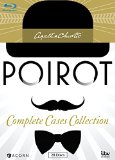| Reviews & Columns |
|
Reviews DVD TV on DVD Blu-ray 4K UHD International DVDs In Theaters Reviews by Studio Video Games Features Collector Series DVDs Easter Egg Database Interviews DVD Talk Radio Feature Articles Columns Anime Talk DVD Savant Horror DVDs The M.O.D. Squad Art House HD Talk Silent DVD
|
DVD Talk Forum |
|
|
| Resources |
|
DVD Price Search Customer Service #'s RCE Info Links |
|
Columns
|
|
|
Agatha Christie's Poirot: Complete Cases Collection
Poirot would work on the murder mystery case along with Captain Hastings, Miss Lemon, and Inspector Japp. Through his detective work and the aid of those around him, Poirot was always the smartest one who could figure the mystery out. In the words of Poirot himself, the famous line would be said about "the little gray cells" helping him to solve the case. The murder-mystery approach is the basis of the show: the main goal of each episode is to introduce a new a mystery with the primary characters reappearing within each case while newer one-off characters primarily exist to carry the new mystery storyline in which Poirot becomes frequently placed in. It was a formula that worked remarkably well for Christie with each subsequent Poirot novel or story and which has continued to delight mystery lovers with the success found with this long-running series.
Premiering almost 70 years following the publication of the first Poirot mystery (which was first issued in 1920), the creation of the show was one which wasn't thought to be an early beginning to a massive cultural phenomenon (even though it was). The beginnings of the show's foundation were actually rather modest. No one involved knew it would become such a giant success worldwide and with the Christie faithful on board to such a high degree. By the time the original Poirot novels ended with the publication of Curtain: Poirot's Last Case several actors had already performed as Poirot in feature film and the expectations for Suchet only went as far as three series. Now, decades later, it is clear that Poirot can be acknowledge as one of the great television hits produced across any time-period.
Getting to play the part of Poirot was considered a huge honor for David Suchet when he was initially requested for the part from the Christie family. Though Agatha Christie herself was unable to see him in the role (as she had already passed away), her family helped handpick Suchet for the role and offered it to him alone. Suchet was not that familiar with the novels written (or with mysteries in general) but was eager to please and liked the idea of having a steady acting job for three years so he agreed to the part. Little did Suchet know the biggest achievement of his entire acting career would end up being his (now famous) portrayal of the beloved Belgium detective.
Exploring the character was key to Suchet bringing the character to life. In doing so, he made a early decision to read all of the Christie Poirot novels and to run through each page-by-page, marking up notes about the characteristics she described in her text for the character. In the process of doing so, Suchet was extremely thorough and ended up with an entire folder of material he culled from the research. Anything from the text was considered essential for perfecting his performance. His aim was to embody and bring the character of Poirot to successful fruition... having audiences smile along with his comedic quirks (bypassing ever laughing at Poirot). The process was an overwhelming success for the remarkably gifted Suchet. He even perfected the tidy-like perfectionism of Poirot in his dedication to dress-attire and would walk with a bit of a limp in certain episodes (as was described by Christie). Performing so impeccably as a method actor, Suchet brought to life Poirot's mannerisms, from the way the character liked his clothing to be clean and precise, to his sugar cubes in coffee/tea, to the way he was with decorations (wanting to arrange them to look a certain way that is orderly and neat).
As a method actor, Suchet would dive into the role in such a manner that he would perform as Poirot even when they were not filming on set. As soon as the mustache and costumed attire was fitted, he delved into the part ten-fold and was always dedicated to performing as Poirot with the greatest authenticity. This began with his vocals: having recognized the peculiarities of his accent from the text, he did special voice-training to masterfully present the inflections of his voice (suggesting both French and the Belgium accompanying the vocals). The voice was perfected for the series, Mon-Ami. Suchet was brilliant at making the character's voice so distinctive and almost as iconic as the show itself.
It is almost no surprise at all that the Christie family thought he would be a great fit: he was also somewhat close in appearance to the description of Poirot from the novels. Though work would of course be done to tweak his physical appearance to eve better fit the part, Suchet had some of the same physical attributes that made the character so distinctive: starting with the egg-shaped head. Poirot was also never portrayed as being particularly, well, fat... but as a man who had an undeniably robust belly. Suchet talked about this being a key similarity between them (though some director's made him wear a fat-suit to make Poirot look even larger: another example of note showcasing Suchet's dedication to playing the part). The curly mustache was always an effort from the make-up/costume department and Suchet went through a variety of them in performing the part over the decades invested. It was part of the signature look and it was something Suchet donned with graceful style.
The series did undergo some creative changes over the years. First of all, it was impossible for everyone involved in the production of the show to remain involved over the years of making Poirot mysteries so viewers can notice some aesthetic differences that appeared over time (such as a shift from lighter color tones to some darker ones in the novel adaptations). The biggest shift came in the form of the storytelling length and format. In the beginning, the series was an hour long (50 min. or so) program with each episode adapting one of the short stories. Over the years the idea came to fruition to focus more on the novels by Christie (which were generally more famous) and have each of those adaptations be even more faithful to the source. Part of the result of this conception was to make the episodes become full length: many seasons exclusively feature film-length episodes which play out much the same as feature films do (yet the episodic format and production schedule keep it from being exactly the same). These episodes are also more faithful in that they do not always feature mysteries which involved supporting characters like Captain Hastings and Miss Lemon. Without these characters, some later episodes have much more emphasis on Poirot and some episodes produced in the later years have less of the lighthearted comedic sensibilities and more of the dramatic moments which were common within the longer novels.
As to the characters... though Poirot can sometimes be a bit difficult for others to work with, the character was also an interesting spirit who was often caring and kind to those around him. He wanted to be able to be helpful to those who needed him for cases he became attached to and he felt he was on a mission to do good in the world and that the good he did as a detective was in service to God: that in the mysteries he worked on he brought forth what was right in the world by helping to protect others. That spiritual component to Poirot is an element Suchet brings to life and is an important part of the character. Poirot had been a successful police officer but became a private detective after an injury left him seriously hurt. He became unable to serve in the same way, but his desire to keep serving others was a driving force behind his work as the brilliant detective he became famously renowned for being.
Poirot's closest companion over the years was Captain Hastings. Hastings was a former British Army officer who began working with Poirot after the war.Hastings knew Poirot earlier when he worked as a police officer and was also close friends with Poirot for years of his life before working together. Though they had known each other for so long it wasn't until the the popular Christie work " The Mysterious Affair At Styles" that the duo became a team. Beyond that impactful aspect of the episode, there is something else that happens: the introduction of Japp. This episode was important for it's introduction to essential characters and as it delivered some much-needed backstory. While Poirot is someone who seemed to deem himself superior to Hastings (especially in regards to intellect), Poirot and Hastings were nonetheless close friends and Hastings often helped to solve the cases. Throughout the show, these two characters had the strongest attachment to each other and continued to stay friends until the very end.
<>Other significant characters of note on the series: Miss Felicity Lemon, Chief Inspector Japp, and Ariadne Oliver. Miss Lemon was a gentle character who helped him in an office setting while working to perfect a filing system for Poirot's cases. Lemon wanted to have everything in order for his mysteries to be managed as effectively as possible. Japp was a Scotland Yard investigator who also worked on many of the same cases as Poirot. Japp and Poirot have sometimes worked together on cases and have a sort of friendly rivalry that exists between them: while they are friends both often work on the same cases, which Poirot usually solves (much to the frustration of Japp). They often aren't solved without the help of Japp, though. Rounding out the supporting cast of characters is Ariadne Oliver, a famous detective novelist (done as a self-referential spoof of Christie herself -- as was written by Agatha Christie in the source novels). Oliver is a character who wanted to help solve some of the (many) mysteries and who becomes friends with Poirot. Oliver adds some comedic flavor the show an is also one of the Poirot's best friends in some of the later adaptations.In delving into the Poirot - Complete Cases Collection audiences can look forward to experiencing (or re-experiencing) fan favorite episodes, such as: Murder on the Orient Express (from Series 12), Hercule Poirot's Christmas (from Series 6), The Mysterious Affair at Styles (from Series 3),Elephants Can Remember (from Series 13), and The ABC Murders (from Series 4). Viewers can also acquaint themselves with some of the episodes most beloved by David Suchet: Death on the Nile, Sad Cypress, and Curtain: Poirot's Last Case. Oh, and every other episode ever produced (for that matter)! Whether viewers want to go back to the beginning and experience the whole thing from start to finish or jump ahead to the most beloved episodes like Murder on the Orient Express (the most famous Christie Poirot), viewers can pick and watch any episode of the entire universe.
Poirot was a meticulously produced program. It had such impressive production designs in each episode: with the sets, locales chosen, and filming styles blending to make for an impressively mounted series. The costumes were strongly impressive as well (with the attention paid to the attire worn by Poirot being particularly noteworthy). The makeup was always top notch with regards to transforming Suchet into the legendary character as well. One can't help but get a feeling that great attention and care was put into these elements and it makes the whole series arrive with a stronger cinematic sensibility. The various director's who contributed episodes created visually impressive and artistic attributes as well (which helped add to the success achieved in the production as well).
The most frequent contributing writers to adapt the stories of Poirot as written by Christie were Clive Exton (who adapted 24 stories between 89-2001), Anthony Horowitz (writer of 11 episodes made between 1991-2001), and Nick Dear (writer of 6 episodes between 2004-2013). The rest of the writers who worked on the show only did 1-4 episodes at the most. So these three writers made a bigger than normal impact on the style of the scripts and how the show was adapted. The show would become infused with a style that managed to effectively mingle between delicate comedic sensibilities of the original writing (and the smart comedy from performers Suchet and Hugh Fraser in particular) while remembering to emphasis the serious dramatic side of the mysteries as well. This balance of writing craft was something that gave the show enough of an airy lightness to keep it well entertaining while also bringing enough intrigue to appeal to mystery lovers.
The finale for the series was from director Hettie Macdonald (who only directed two episodes of Poirot in total), and screenwriter Kevin Elyot (who only adapted three of the Poirot stories). The episode still manages to make a huge impression, be highly memorable as a compellingly done finale to the long-running show. The episode Curtain carried a different tone and style to many mPoirotysteries while not being radically different to the point of not meshing with the show's conclusion. This was a sad, grim episode but one which brings back plot-points and characters effectively and the style was effectively darker (even the cinematography was a few shades of color away from a normal episode) and the script kept a good balance of the nostalgic Poirot moments while presenting the new mystery (for the very last time). Both Macdonald and Elyot created a terrific conclusion, even if it is one that will leave audiences both sad (for the story by Christie) and for saying farewell to Poirot (as no future episodes will be produced now that the entirety of Christie's stories featuring Poriot have been adapted).
Even though Poirot is now complete as a television production it is clear that the legacy of the show and character is nowhere near completed. Audiences around the world will continue to discover these stories ( in books and in television). Suchet's performance will not be left forgotten and will instead delight many generations to come. Christie had formed one of the most beloved literary characters of all time and Suchet performed as the character so magnificently that everything about his performance seems to have become synchronous with the original stories. This is remarkable and something that sets the television series of Poirot apart as a huge television achievement for the ages: one to be cherished by the established fans and to be shared with newcomers for many years to come. Poirot himself would be pleased.
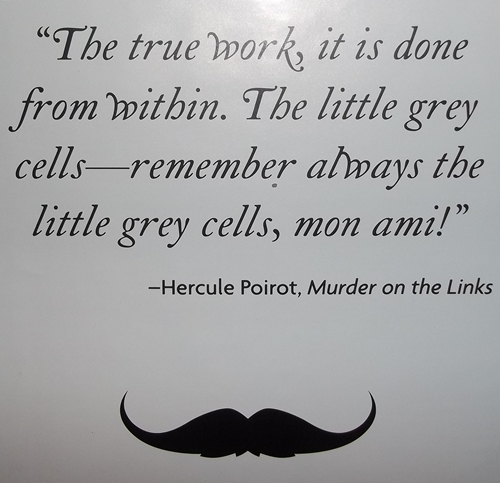
The Blu-ray:
Video:
Poirot has made its way to Blu-ray in one complete collection at last! This is undoubtedly the sort of collection that many fans have been waiting for all these years: a definitive set that is presented in the best possible way. Comprising a mammoth 28 Blu-ray discs to present the entirety of the series run, this collection is a huge step up in quality over previous DVD's available of the show in individual volumes. The picture is crisp and clean in a way many viewers might not have imagined possible.
Returning to the original film elements, this is assuredly the finest way to experience the show. The original framing for each of the individual series has been fully preserved and the quality of the transfers and encoding is astonishing with firm detail and clarity. The image has a beautiful, naturally filmic quality throughout the earlier episodes and when the series shifts towards a more modern style of photography in the later series the production quality still maintains a impressive aesthetic even as the style is somewhat shifted across the years.
Colors are notably accurate and are much better than ever before on home media. While the previous releases from several years ago sometimes had faded color and image stability, it appears Acorn Media have gone above and beyond to preserve this classic show in the best quality possible. With 1080p, MPEG-4 encoding, fans should rest assured they are getting a decidedly high-quality presentation of the show. Series 1-8 are all presented in the original broadcast aspect ratio of 1.33:1 (full frame) and series 9-13 are in the 1.78:1 (widescreen) broadcast aspect ratio.
The filmmaking intents of the producers and of the directors has been fully preserved with this release. Viewers will be both pleased by the faithfulness of the presentations and all of the fine detail they may not have ever noticed before in terms of the color reproduction, costumes, set designs, and beautiful locales. Indeed, everything looks much richer throughout these high-definition presentations. Even the mustache of Hercule Poirot himself has never looked as impressively grand. Magnifique!
Audio:
The audio presentation for Poirot on the Complete Cases collection has a lot to offer viewers of the series. While there are certain differences between series, each series still has quality audio available for fans of the long-running series. Unlike earlier releases of Poirot, the audio is also remastered. Certain series have been presented with standard Dolby Digital 2.0 stereo, others with Uncompressed PCM 2.0 stereo, and several (towards the series end) in DTS-HD Master Audio 2.0 stereo.
For audio enthusiasts, the main difference here is in a bigger boost in clarity for the home-theater audio buff on the lossless Uncompressed PCM and DTS-HD Master Audio discs but everything shines on the set with even the 2.0 Dolby Digital showing reasonable clarity in preserving the show's sound.
Dialogue is clean and easy to understand and while the show doesn't have anything fancy going on in terms of its rather basic sound design (with less done in terms of the overall ambiance or sound effects), the dialogue-heavy series has been well presented here and it is difficult to imagine longtime fans (and series newcomers) walking away feeling disappointed by the presentation quality. The music (including the iconic opening theme) created by composer Christopher Gunning (who composed 41 episodes in total) sounds lovely on the release too.
Breakdown of the audio presentation across the Poirot: Complete Cases Collection: Series 1-2 feature Dolby Digital 2.0 stereo, Series 3-6 feature Uncompressed PCM 2.0 stereo, and Series 7-13 feature DTS-HD Master Audio 2.0 stereo.
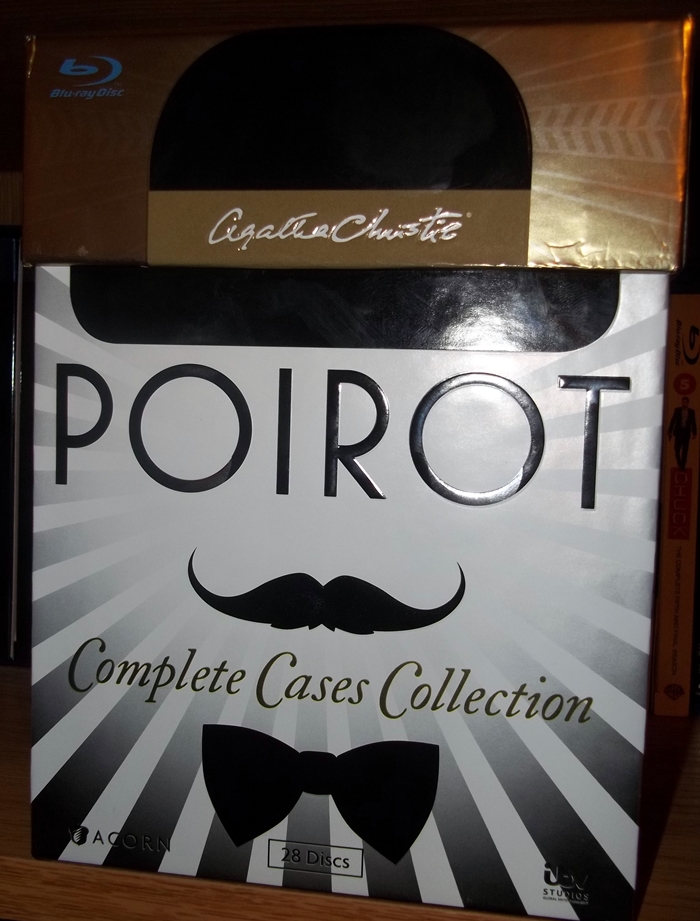
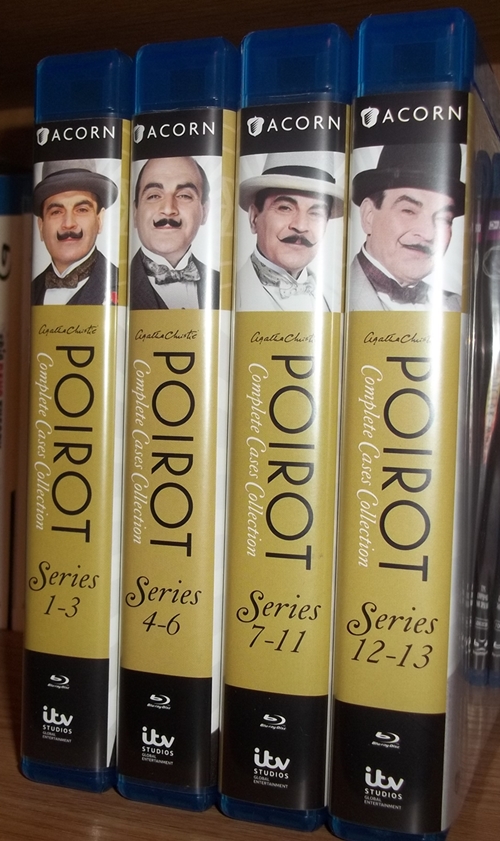
Extras:
Packaged in jumbo Blu-ray cases (featuring an outer box housing everything) and with a famous quote from the series on a drop-down panel, each part is included with sturdy packaging and a individual cover-art featuring David Suchet as Poirot from over the years, and with the outer packaging design featuring impressive embossing this is a beautifully designed complete collection that will satisfy fans of the show.
The Complete Cases collection contains more supplemental materials than ever before for Poirot on home media. Owners will first discover the inclusion of a well-put-together booklet featuring an introduction written by David Suchet, a informative "About Poirot" section, an essay entitled "David Suchet's Hercule Poirot" written by Matthew Prichard (whose grandmother was Agatha Christie), a "The Mysteries" section with episode synopsizes and air-dates, a "Poirot's Pals" section with information on the main characters of the Poirot universe, the Hercule Poriot obituary first published by the New York Times in 1975, entitled "Hercule Poirot is Dead; Famed Belgium Detective", and "Undisputed Head Girl", a section about Agatha Christie herself.
On disc supplements include:
Being Poirot (1 hr. 2 min.) is arguably the grandest inclusion featured on the set. The supplement is a detailed exploration of the creation of the series, David Suchet's performance, and the history surrounding this adaption. David Suchet helps to lead the documentary while reflecting upon his journey now that he is at the end of the series. Host Stanley Tucci helps to bring this nice special somewhere truly special as the show is explored on a variety of levels.
Suchet takes a trip to Greenway and discusses his first encounter with the Christie family and their request for him to play the part of Poirot, he explores production companies and actual locations which had an impact on the filming of Poirot, explores the theatrical world of Poirot with other actors playing the part, revisits the Orient Express (from one of his decidedly famous episodes), and some behind-the-scenes moments are featured that help to explore the filming of episode "Dead Man's Folly" , which Suchet thought would make for a better "filming" episode to end on (both for himself and the crew) rather than ending his experience of playing the character with Poirot's moments of illness and death.
Interview with David Suchet (18 min.), in which Suchet answers some questions related to his experience making the series over 25 years of performing as the beloved character Poirot, the series legacy, his approach to the character, and more.
Interview with Matthe Prichard (33 min.) is another question-based discussion about the series and legacy of Poirot with Agatha Christie's grandson.
Super Sleuths (47 min.) is another making-of documentary about the Poirot television series, featuring some behind the scenes footage and an abundance of interviews -- done before the filming of the final section of the series and the making of Curtain: Poirot's Last Case.
Behind-the-Scenes Featurette: Making-Of (46 min.) is an earlier supplemental offering which offers more glimpses of on-set filming and the production process for the series, interspersed with a variety of Poirot clips from the show.
Interview with David Suchet (19 min.) is another sit-down interview with the masterful actor who performed Poirot with great craft for so many years.
Lastly, the collection includes some production notes written by David Suchet and Tim Curry and a number of photo galleries featuring series production stills.
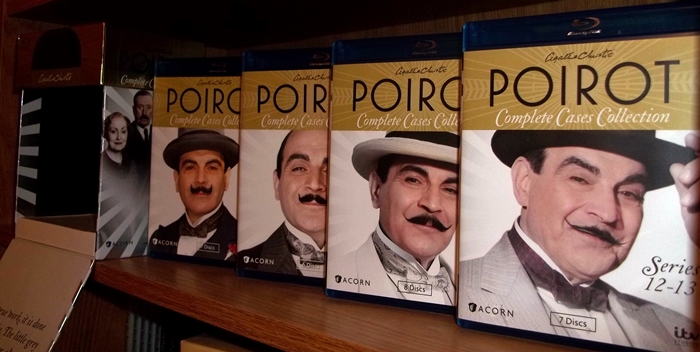
Final Thoughts:
The Poirot: Complete Cases Collection is a 28 disc Blu-ray set by Acorn Media containing the complete run of the series from 1989 to the finale filmed in 2013: every episode and all presented in original UK broadcast order and comprising adaptations of the entirety of Agatha Christie's stories and novels featuring the beloved Belgium detective. Everything featuring Poirot has been adapted and performed by David Suchet. This is truly a complete run and a set that represents the totality of the work from both Christie and David Suchet in bringing this character to the world. It doesn't come any more complete than it does here in this deluxe set for series fans: it's got it all. Whether purchased as a gift (or perhaps as a gift to yourself), this is a collection made to please fans and it is deserving of DVD Talk's highest recommendation.
DVD Talk Collector Series.
Neil Lumbard is a lifelong fan of cinema. He aspires to make movies and has written two screenplays on spec. He loves writing, and currently does in Texas.
|
| Popular Reviews |
| Sponsored Links |
|
|
| Sponsored Links |
|
|
| Release List | Reviews | Shop | Newsletter | Forum | DVD Giveaways | Blu-Ray | Advertise |
|
Copyright 2024 DVDTalk.com All Rights Reserved. Legal Info, Privacy Policy, Terms of Use,
Manage Preferences,
Your Privacy Choices | |||||||









